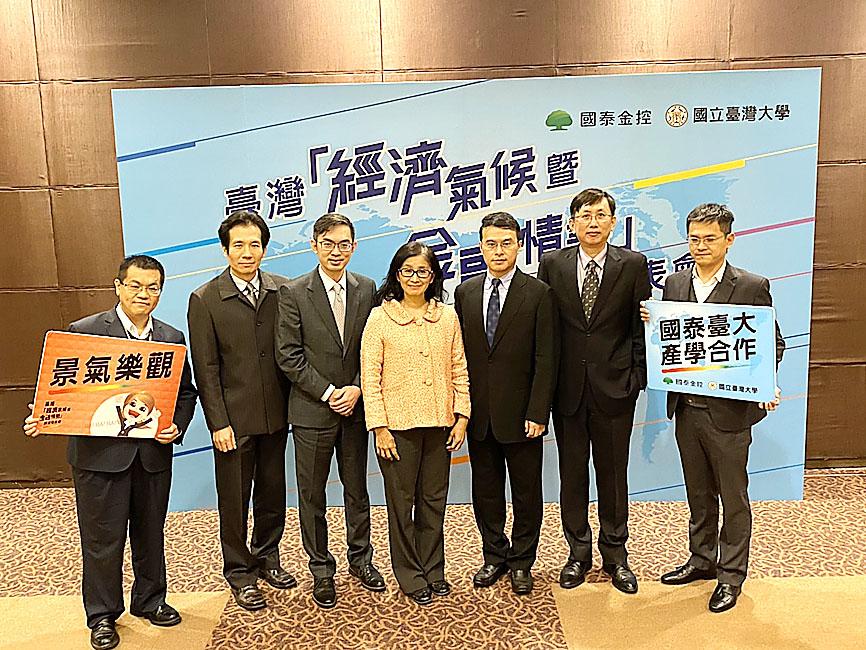Cathay Financial Holding Co (國泰金控) yesterday raised its forecast for the nation’s economic growth this year to 4.2 percent, up from the 3.2 percent it predicted in December last year, due to stronger-than-expected private investment and the improving global situation, it said.
The firm raised its prediction for private investment growth to 3.7 percent, as Taiwan Semiconductor Manufacturing Co (TSMC, 台積電), the world’s largest contract chipmaker, in January raised its capital expenditure to between US$25 billion and US$28 billion, it said.
Cathay Financial previously expected private investment to slow this year and grow 2.5 percent in light of a high comparison base last year.

Photo: Allen Wu, Taipei Times
TSMC’s investment could be a gauge for investment in the local technology industry, and its larger-than-expected investment indicated that overall investment is likely to retain healthy momentum this year, said Hsu Chih-chiang (徐之強), a professor of economics at National Central University who heads a research team commissioned by Cathay Financial.
Taiwanese firms would continue to benefit from strong demand for new technology applications and devices required to maintain a low-contact economy, Hsu said.
Meanwhile, with more countries beginning to distribute COVID-19 vaccinations, the global economy is expected to rebound, which would boost foreign consumption and Taiwan’s export orders, Hsu said.
“We predict that the nation’s exports are likely to remain strong in the first half of this year, but the pace of increase might slow in the second half due to a high comparison base last year,” he said.
Cathay Financial forecast that the central bank would keep benchmark interest rates unchanged this year, as the nation’s inflation is expected to remain mild, Hsu said.
“The local economy’s growing momentum and inflation pressure would increase the chance of the central bank raising rates, but on the other hand, volatility in the global financial system is expected to rise, which would trim the possibility of rate increases,” Hsu said.

Taiwan’s rapidly aging population is fueling a sharp increase in homes occupied solely by elderly people, a trend that is reshaping the nation’s housing market and social fabric, real-estate brokers said yesterday. About 850,000 residences were occupied by elderly people in the first quarter, including 655,000 that housed only one resident, the Ministry of the Interior said. The figures have nearly doubled from a decade earlier, Great Home Realty Co (大家房屋) said, as people aged 65 and older now make up 20.8 percent of the population. “The so-called silver tsunami represents more than just a demographic shift — it could fundamentally redefine the

Businesses across the global semiconductor supply chain are bracing themselves for disruptions from an escalating trade war, after China imposed curbs on rare earth mineral exports and the US responded with additional tariffs and restrictions on software sales to the Asian nation. China’s restrictions, the most targeted move yet to limit supplies of rare earth materials, represent the first major attempt by Beijing to exercise long-arm jurisdiction over foreign companies to target the semiconductor industry, threatening to stall the chips powering the artificial intelligence (AI) boom. They prompted US President Donald Trump on Friday to announce that he would impose an additional

China Airlines Ltd (CAL, 中華航空) said it expects peak season effects in the fourth quarter to continue to boost demand for passenger flights and cargo services, after reporting its second-highest-ever September sales on Monday. The carrier said it posted NT$15.88 billion (US$517 million) in consolidated sales last month, trailing only September last year’s NT$16.01 billion. Last month, CAL generated NT$8.77 billion from its passenger flights and NT$5.37 billion from cargo services, it said. In the first nine months of this year, the carrier posted NT$154.93 billion in cumulative sales, up 2.62 percent from a year earlier, marking the second-highest level for the January-September

Asian e-commerce giant Shein’s (希音) decision to set up shop in a historic Parisian department store has ruffled feathers in the fashion capital. Anger has been boiling since Shein announced last week that it would open its first permanent physical store next month at BHV Marais, an iconic building that has stood across from Paris City Hall since 1856. The move prompted some French brands to announce they would leave BHV Marais, but the department store had already been losing tenants over late payments. Aime cosmetics line cofounder Mathilde Lacombe, whose brand was among those that decided to leave following